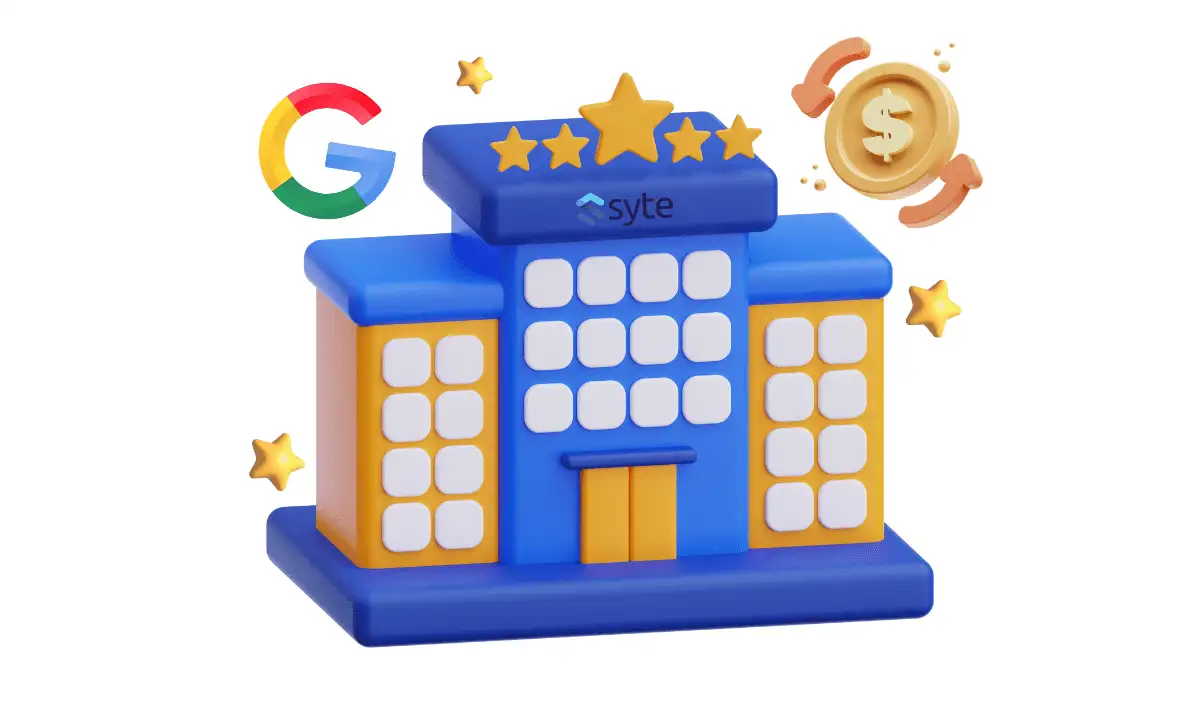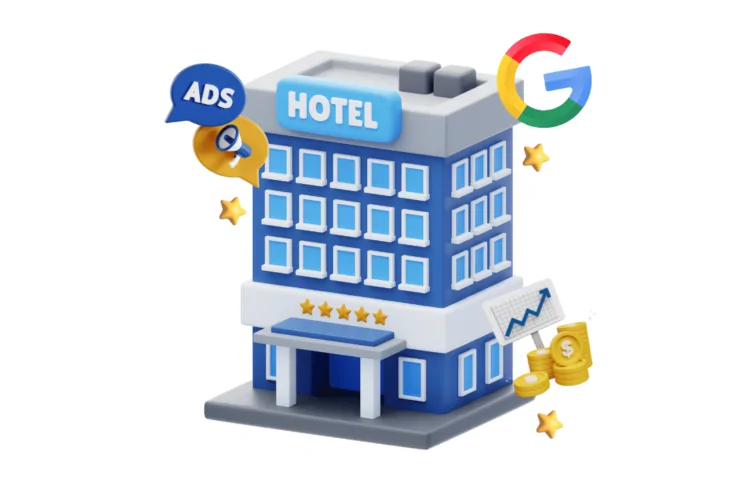In the competitive world of hospitality, it’s crucial to get the best Return on Investment (ROI) from your advertising efforts. Hotels are constantly looking for ways to increase direct bookings and lessen their dependence on Online Travel Agencies (OTAs). Google Hotel Ads have become an important tool to do just that. These ads help hotels stand out, attract direct bookings, and make the most of their advertising budget. In this blog post, we’re going to look at how to make the most of Google Hotel Ads for the best ROI.
Understanding Google Hotel Ads
What Are Google Hotel Ads?
Google Hotel Ads are a special kind of ad within the Google Ads platform, made just for the hotel industry. They allow hotels to show their properties directly in Google Travel search results. This gives them a unique opportunity to catch the eye of people who might want to book a stay.
Benefits of Google Hotel Ads
- Increased Visibility: Stand out in Google Travel search results.
- Direct Bookings: Encourage guests to book directly through your website, saving on OTA fees.
- Advanced Features: Access tools like free booking links and tailored audience targeting.
Setting Up Hotel Campaigns
To start with Google Hotel Ads, hotels need to create hotel campaigns on the Google Ads platform. Here’s how:
- Create a Google Ads Account: Start here if you don’t have one yet.
- Link to a Hotel Centre Account: This will help manage your hotel listings.
- Configure Campaign Settings: Set budgets, bidding strategies, and targeting options.
Bidding Strategies and Cost Models
Overview of Bidding Strategies
Selecting the right bidding strategy is essential for your Google Hotel Ads to do well. Here are some choices:
- Commissions (Per Stay): Pay a percentage of the booking value only for completed stays, saving on cancellations or no-shows.
- Commissions (Per Conversion): Pay a fixed percentage for every booking, even those that get cancelled.
- Manual CPC (Cost-Per-Click): Set a fixed amount to pay for each click, giving you control over your budget.
Cost Models and Their Implications
- CPC%: Set your bid as a percentage of the room price per night for each click, aligning costs with potential revenue.
- Enhanced CPC: This model automatically adjusts bids using signals at auction time, employing Google’s data for better optimisation.
Performance Max and Automated Bidding
Introduction to Performance Max
Google’s Performance Max is a strong tool that uses automation to buy ads across different channels, including YouTube, display ads, and Google search results. It works with hotel booking engines to optimise where the ads appear.
Benefits and Limitations
- High Returns: Performance Max often yields better ROI compared to other ad types.
- Steady Presence: Keeps your ads consistently visible across various platforms.
- Limited Visibility: Works like a “black box,” offering little insight into which channels perform best.
Integration with Booking Engines
Performance Max uses inputs like ad copy, images, videos, and customer profiles to place ads effectively, making sure your ads reach the right people at the right time.
Key Performance Indicators (KPIs)
Essential KPIs for Google Hotel Ads
- Click-Through Rate (CTR): Shows the percentage of users clicking on your ad after seeing it.
- Cost-Per-Click (CPC): The cost each time someone clicks on your ad.
- Conversion Rate: The percentage of users completing a desired action, like booking a room.
Evaluating Ad Performance
- Return on Ad Spend (ROAS): The revenue earned for every pound spent on advertising.
- Average Daily Rate (ADR): The average price paid for rooms sold.
- Occupancy Rate: The percentage of available rooms that are filled.
Assessing Ad and Landing Page Quality
- Quality Score: Measures how good and relevant your ad and landing page are.
- Cost Per Acquisition (CPA): The expense to gain one customer or conversion.
Optimising Ad Campaigns
Strategies for Enhancing Ad Effectiveness
- Geotargeting: Focus ads on specific locations to attract local and international visitors.
- Social Proof: Use guest reviews and ratings to build trust and credibility.
- User Experience: Ensure the ad copy and landing pages offer a smooth user journey.
Driving Bookings with Incentives
- Discounts: Offer special prices to attract bookings.
- Free Amenities: Provide complimentary services to enhance the guest experience.
- Exclusive Offers: Develop unique packages to lure potential guests.
Campaign Optimisation Techniques
- A/B Testing: Continuously test different ad versions to discover what performs best.
- Negative Keyword Cleanups: Keep negative keywords updated to avoid irrelevant traffic.
Leveraging Advanced Features
Boosting Visibility with Free Booking Links
Google’s free booking links enable hotels to list properties directly in Google Travel search results, enhancing visibility and encouraging direct bookings at no extra cost.
Targeted Advertising with Custom Audiences
Define custom audiences or use Google suggestions to target specific customer segments based on their interests and intentions.
Optimising Bidding Strategies with Bid Adjustments
Adjust bids considering factors like traveller location, device type, length of stay, and audience lists, helping in fine-tuning bidding strategies.
ROI and Benchmarking
Factors Affecting ROI
- Location: Hotels in top spots may see higher ROI.
- Competition: High competition can lead to increased bidding costs.
- Bidding Strategy: The chosen approach affects overall ROI.
Importance of Benchmarking
Benchmarking is critical to grasp the average ROAS that hotels can expect. The typical ROAS for hotels on Google Ads is around 10-13%, with Performance Max campaigns often bringing in higher returns.
Higher ROAS Potential with Performance Max
Due to its multi-channel reach and automated bidding, Performance Max often provides better returns.
Challenges and Considerations
Limited Visibility in Performance Max Campaigns
The “black box” setup of Performance Max makes it difficult to see which channels contribute most to conversions.
Impact of Competition on Bidding Costs
Hotels in highly competitive areas may face higher costs due to increased competition in bidding.
Importance of Price Accuracy and Budget Management
- Price Accuracy: Adhere to Google’s Price Accuracy Policy to stay competitive in auctions.
- Budget Management: Manage budgets effectively to ensure campaigns don’t exceed their limits.
Emerging Trends and Best Practices
Optimising Bidding Strategies with Automation and AI
More automation and AI in bidding strategies, like Performance Max, are refining ad placements and improving ROI.
Growing Importance of Personalisation and Sustainability
- Personalisation: Ads are increasingly tailored to user intent and preferences, boosting their relevance and effectiveness.
- Sustainability: Emphasising sustainability and eco-friendliness is becoming vital as travellers become more aware.
Enhancing Ad Appeal with High-Quality Visuals
Using top-quality visuals and videos to make hotels more appealing is a growing trend.
Conclusion
Navigating Google Hotel Ads to maximise ROI means using a combination of good bidding strategies, ad optimisation, advanced features, and keeping up with new trends. By understanding Google Hotel Ads, hotels can compete effectively, rely less on OTAs, and drive more revenue through direct bookings. Achieving success requires careful planning, ongoing optimisation, and an understanding of the tools within the Google Ads platform.
At Syte, we help hotels tackle the nuances of digital marketing, including Google Hotel Ads. Our experts are committed to boosting your ROI and increasing direct bookings. Contact us today to see how we can help your hotel thrive in the digital arena. Contact Syte.



